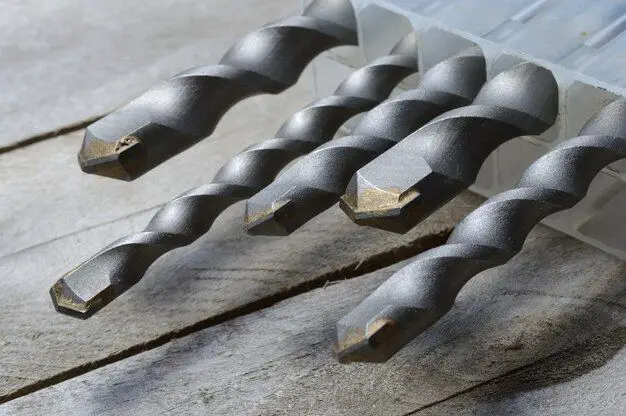When it comes to hammer drill bits, there are some key differences to be aware of. Hammer drill bits are not universally the same – the type of bit you need depends on the material you are drilling into. Understanding the variations in hammer drill bits will ensure you select the right one for the job.
Page Contents
The Purpose of Hammer Drills and Bits
Hammer drills have a pounding action in addition to the rotary drilling motion. This allows them to drill into hard materials like concrete, brick, and stone. The hammering action is achieved through two ratcheting plates that rapidly move back and forth, striking the bit as it rotates.
The hammer drill bits have a similar tip to standard drill bits, but the shank is designed to withstand the hammering force. The grooved shank allows for dust and debris to escape as the bit penetrates the material. Without this feature, the accumulated debris could bind up the bit.
Type of Hammer Drill Bits
There are three main types of hammer drill bits:
Masonry Bits
Masonry bits, often called masonry points, are designed for drilling into concrete, brick, cinderblock, and other masonry materials. They have a carbide tip to cut through the abrasive material while minimizing wear. Brazed carbide tips are extremely durable.
SDS or SDS Plus Bits
SDS (Slotted Drive System) bits have a splined shank that engages with the chuck on SDS rotary hammers. This allows them to withstand greater impact force from the hammering mechanism. These are optimized for concrete drilling but can be used on other masonry too.
Hex Shank Bits
Hex shank hammer drill bits fit into hammer drills that don’t have an SDS chuck. They have a 1/4″ hex shank to fit standard chucks. The grooved body allows debris removal. They can be used on concrete and other masonry but are best for lighter duty drilling.
Bit Material
Carbide tipped bits are the most common and provide the best performance in concrete and other masonry applications. They maintain their sharp cutting edges much longer than high-speed steel bits. Solid carbide bits are even more durable but also more expensive.
High-speed steel is a cost-effective option for occasional use in masonry materials. However, they require more frequent sharpening and replacement than carbide. They are best suited for block and softer brick.
Bit Diameter
Larger diameter bits cut a bigger hole faster. They remove more material in one revolution than smaller bits. However, the larger the diameter, the more hammer drill power required. Exceeding the drill’s recommendations can lead to stall outs and bit breakage.
Smaller diameter bits require less power but take longer to drill a hole. Variable sizes allow you to match the bit to the hole size needed and power of your hammer drill.
Accessory Features
Some enhancements maximize bit performance and convenience:
- Depth stops – Allow precise, repeatable hole depth control
- Ejector pins – Help knock out plugs from core bit holes
- Coolant holes – Improves bit life by flushing cutting area
- Pilot points – Guide bit and prevent walking on smooth surfaces
Conclusion
While there are commonalities between them, hammer drill bits have important differences depending on material drilled and drill compatibility. Considering your application and drill requirements will ensure you get the right hammer drill bit for the job.
